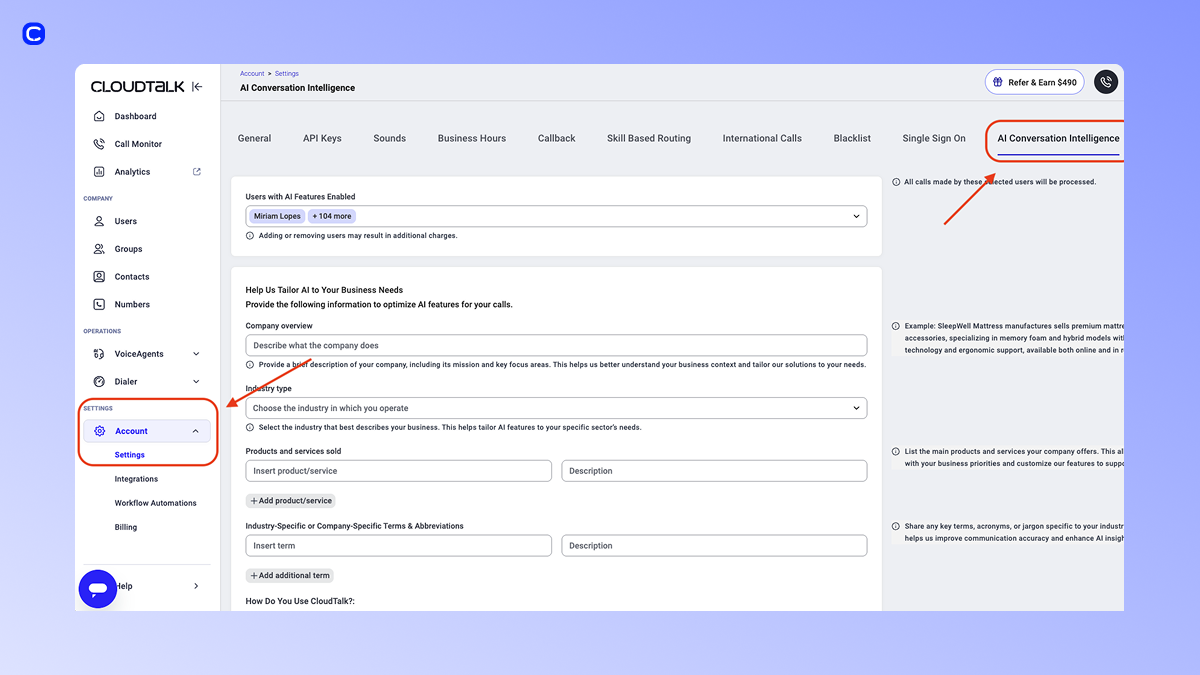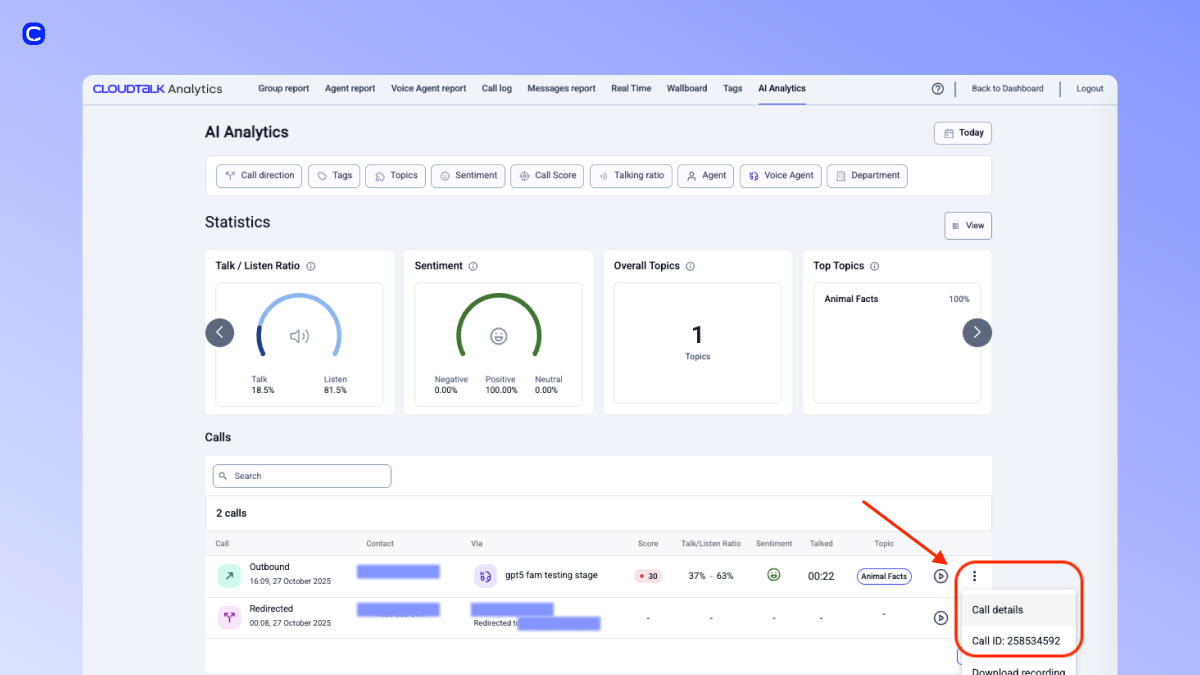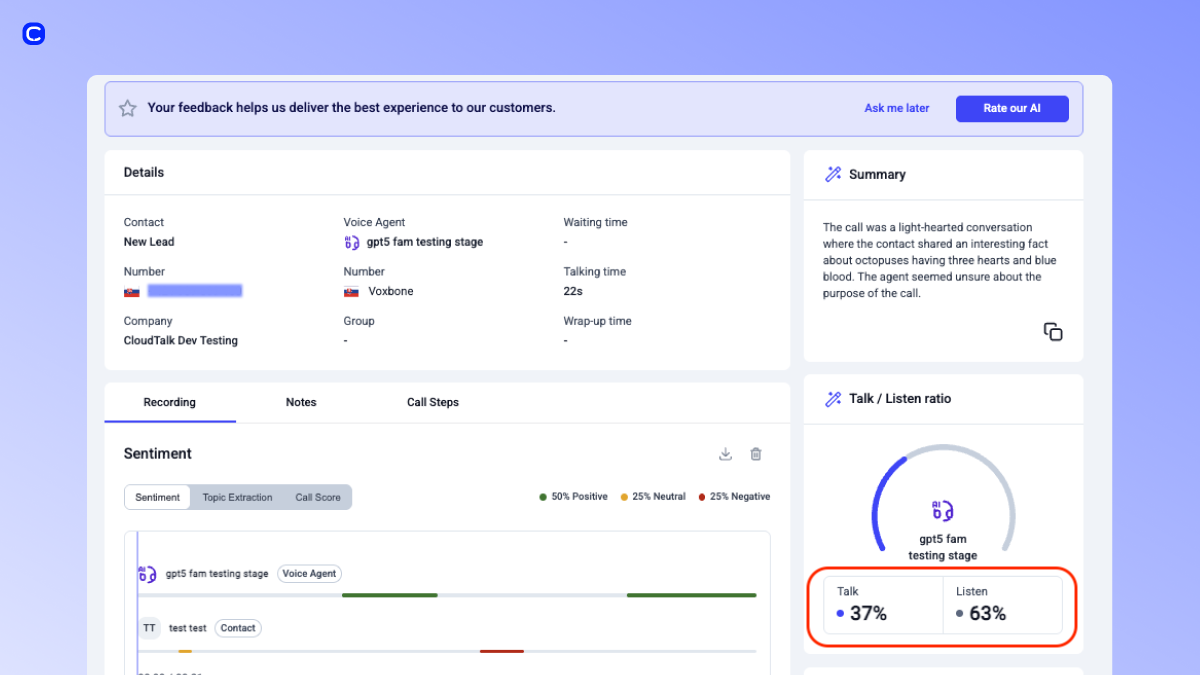How to Use AI to Measure Talk-to-Listen Ratio on Sales Calls. Step-by-step Guide
TL;DR
How the Talk-to-Listen Ratio is calculated:
-
Agent Talk Time = sum of all agent speaking segment durations.
-
Customer Talk Time = sum of all customer speaking segment durations.
-
Agent Listen Time = Total Call Length − Agent Talk Time (same for customer).
-
Talk-to-Listen Ratio (agent) = Agent Talk Time : Agent Listen Time (also shown as percentages).
-
01
Record the call → audio is captured for analysis.
-
02
AI transcribes & tags speakers (agent vs. customer) with start/end times per speaking segment.
-
03
View results in AI Analytics Report and in Call Details—you’ll see the talk-to-listen ratio per call, rep, or team.
-
04
Filter & compare by date/team to spot patterns and coaching opportunities.
-
05
Coach & improve using real examples and trends.
Sales reps like to talk…but are they chatting a bit too much on calls? That would be a mistake, as reports show that top-performers talk only 43% of the time¹. Turns out, the best way to sell is to shut up and listen.
Keep reading to find out—step by step—how to use AI to measure talk-to-listen ratio on sales calls, and how to fix it.
Help Your Reps Talk Less, Sell More
How to Measure Talk-to-Listen Ratio in Sales Calls
Talk-to-Listen Ratio Definition
The talk-to-listen ratio measures how much a salesperson talks versus how much they listen during a sales call. In sales calls, it should be 43:57
Using AI tools for analyzing sales calls, CloudTalk automatically processes each conversation through speech recognition and speaker segmentation.
They do this using Whisper, a transcription model that identifies every speaker, timestamps their speech segments, and classifies who’s talking—agent or customer.
Once the call ends, CloudTalk adds up the total talk time for each speaker and calculates their listening time by subtracting that from the call’s total duration. The resulting talk-to-listen ratio is pre-computed in the backend and displayed instantly in your Analytics dashboard.
You’ll see these insights as clear percentages and visual curved bars inside each Call Detail view, alongside recordings, transcripts, and extracted topics. That means you can review your agents’ conversations, assess engagement, and coach more effectively—without manual tracking.
Did you Know?
Top-performing sales reps listen 57% of the time—and close rates increase by up to 20% when reps let prospects do most of the talking².
How to Set Up and Use Talk-to-Listen Ratio in CloudTalk
Getting started is simple—all you need is Conversation Intelligence access and call recording enabled.
Step 1: Assign Users to Conversation Intelligence
Go to Account → Settings → AI Conversation Intelligence → General Settings. Under the Users section, search and select any team members whose calls you want processed by AI.
Step 2: Turn On Call Recording
Make sure call recording is active for those selected users—this allows the AI to capture and transcribe each segment accurately.
Step 3: Access Your Analytics Dashboard
Once setup is complete, head to your AI Analytics Report. You’ll find metrics like talk-to-listen ratios, call summaries, and sentiment trends across your team.
Step 4: Review and Coach with Data
Inside each Call Detail view, you’ll see percentages showing talk and listen time, plus a curved bar visual. Managers can use the metrics from these AI tools for measuring talk-to-listen ratio on sales calls and provide feedback, identify trends, and track progress over time.
Did you Know?
A study by Demodesk found that for 328 B2B sales meetings, discovery-call host talk ratios between 40-60% correlated with significantly higher client engagement and deal progression³.
Pro tip
Use AI tools for measuring talk-to-listen ratio on sales calls to compare performance over time and correlate listening behavior with conversion rates.
What Is the Ideal Talk-to-Listen Ratio?
According to an analysis of over 25,000 sales calls, the average talk-to-listen ratio in successful calls is around 43:57—meaning the best reps spend about 57% of the conversation listening and 43% talking.
Of course, the “ideal” ratio depends on the call type:
-
Discovery calls: around 43:57 (listen more)
-
Product demos: closer to 60:40 (more explanation time)
-
Negotiations or renewals: 50:50 (balanced discussion)
For the best results, use CloudTalk’s conversation analytics to establish benchmarks based on your top-performing reps and sales performance insights to track ongoing improvements.
Measure What Really Drives Sales
Common Mistakes When Measuring Talk-to-Listen Ratio in Sales Calls ( and How to Fix Them)
-
01
Ignoring context
Different calls need different ratios—discovery call ~ 43:57 (listen more); product demo ~ 60:40 (more explanation time); renewals ~ 50:50 (balanced discussion). -
02
Chasing the average
One rep could be a chatterbox, and another a monk, but together they look balanced. Make sure to check individual trends, not the mean. -
03
Counting silence as listening
Five seconds of awkward pause does not equal active listening. Use tools that recognize intentional pauses. -
04
Trusting messy transcripts
When your software can’t tell who’s speaking, your ratio’s junk. Pick analytics with solid speaker detection—like CloudTalk’s Conversation Intelligence. -
05
Forgetting that listening ≠ waiting to talk
Don’t be that guy.
Use AI to measure talk-to-listen ratio
Best Practices for Measuring and Improving Talk-to-Listen Ratio
-
01
Set a benchmark for every call type
Different conversations need different talk-to-listen ratios. Discovery calls usually hover around 43:57, demos lean closer to 60:40, and renewals stay near 50:50. Use CloudTalk’s call center analytics dashboard to benchmark ratios by call type, rep, or campaign—and keep your insights consistent over time. -
02
Use AI conversation intelligence to measure automatically
Manually timing who talks is… not a good use of anyone’s time. Let AI speech analytics software do the heavy lifting. It detects speakers, calculates ratios, and flags patterns so you can focus on coaching instead of spreadsheets. -
03
Analyze ratios in context with real outcomes
A 43:57 split doesn’t mean much without results. Compare talk-to-listen data to conversion rates, call duration, and sentiment analysis using CloudTalk’s speech analytics call center software. That’s how you see what actually drives deals — not just who’s doing the talking. -
04
Coach with real conversations
Theory’s great, but playback is better. Use call recording software for small business to review snippets, highlight strong listening moments, and give feedback that actually sticks. The best sales coaching sounds like a conversation, not a lecture. -
05
Train reps in questioning and active listening
Improving the ratio isn’t about talking less—it’s about listening better. Teach reps to ask open-ended questions, pause intentionally, and reflect back what they’ve heard. These micro-skills can transform your call center performance. -
06
Track long-term progress and celebrate wins
Talk-to-listen ratios improve slowly but steadily. Use dashboards inside CloudTalk’s speech analytics solution to monitor changes, reward consistency, and show reps how better listening drives better results.
Let CloudTalk Do the Listening
Listen More, Close More
The talk-to-listen ratio shows how well your reps listen, connect, and adapt in real conversations. With AI-powered speech analytics, you can track talk time, sentiment, and engagement automatically—giving you real-time visibility into what top-performing calls actually sound like.
CloudTalk’s Conversation Intelligence makes it effortless to measure and improve your talk-to-listen ratio, so every call is a step closer to closing the deal.
Start Measuring Smarter
Sources:
- 01
- 02
- 03
















